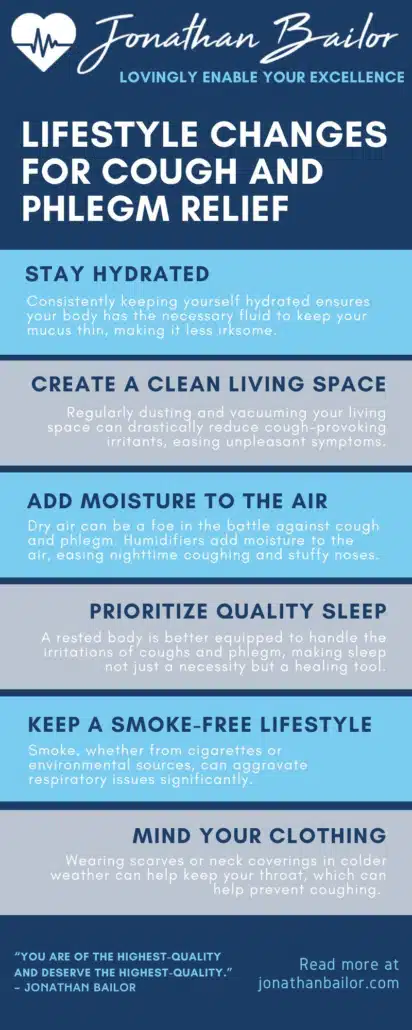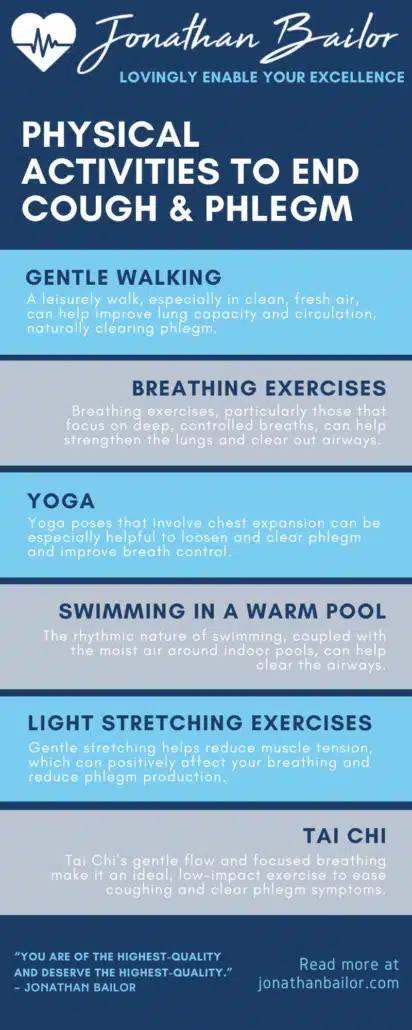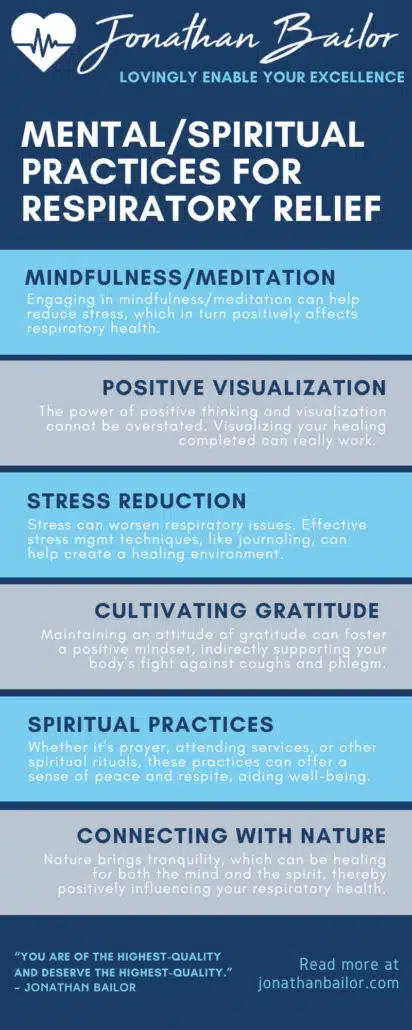Embracing 23 Natural Remedies to Clear Phlegm and Ease Cough
Here are 23 natural remedies to clear phlegm and ease cough with Jonathan Bailor in this epic cough and phlegm post!
When the annoyance of a persistent cough and the discomfort of phlegm take hold, it can feel like an unwelcome interruption to the rhythm of daily life. Yet, there is a silver lining in this cloudy scenario. The world is brimming with natural remedies, each holding the promise of relief and comfort without the need to step foot in a pharmacy.
Get even more help with your cough and phlegm troubles by checking out our popular 26 Natural Remedies for Coughing Up Phlegm at Every Stage of Life and 28 Ways to Combat Phlegm Build-up During Cold Season guides!
Imagine embarking on a journey of discovery where the treasures of nature offer gentle, practical solutions to soothe your cough and clear phlegm. This path is not just about finding relief; it’s about tuning into the harmonious ways of nature and the healing power it holds.
As you delve into the upcoming exploration of these remedies, think of it as unlocking a treasure trove of wisdom passed down through generations. Each suggestion, steeped in simplicity and effectiveness, is more than just a remedy; it’s a testament to the resilience and resourcefulness inherent in nature and ourselves.
Sharing this knowledge becomes more than a gesture; it’s an act of caring, a way to connect with friends and family by offering them keys to the same soothing relief. Imagine the conversations sparked and the bonds strengthened as these natural secrets are passed from one person to another.
So, as you prepare to dive deeper into the world of natural cough and phlegm remedies, remember that this journey is not just about alleviating a symptom. It’s about embracing a lifestyle that prioritizes natural well-being, sharing invaluable insights, and cherishing the quiet joy of health regained. Here’s to beginning this journey towards a more natural, serene state of health.
Nurturing Wellness: Lifestyle Adjustments for Cough and Phlegm Relief
Embarking on a journey toward better health can often feel like navigating a maze. Still, sometimes the simplest changes in our lifestyle can lead to profound improvements, particularly when dealing with the discomfort of coughs and phlegm. Here are some thoughtful yet practical lifestyle adjustments to consider:
1. Embrace the Art of Hydration
Water is the unsung hero in our daily lives, especially when you want to combat coughs and clear phlegm. Consistently keeping yourself hydrated ensures your body has the necessary fluid to keep your mucus thin, making it less irksome. This doesn’t mean overdoing it, but rather, finding a balance that keeps your body refreshed and your throat soothed. If you want to mix up your hydration routine, try adding a few drops of lemon juice to your water for a zesty twist.
2. Cultivate a Clean Living Space
The environment we inhabit plays a significant role in our health. Regularly dusting and vacuuming your living space can drastically reduce the irritants that exacerbate coughs. It’s about creating a sanctuary where your respiratory system isn’t constantly under siege from dust and allergens.
3. Master the Art of Moist Air
Dry air can be a foe in the battle against cough and phlegm. Using a humidifier, especially during dry months or in arid climates, adds moisture to the air, providing a soothing balm to irritated airways and helping to loosen mucus and clear phlegm. Humidifiers can also help ease nighttime coughing and stuffy noses. Cool mist humidifiers, warm mist humidifiers, and steam vaporizers effectively add moisture to the air. If you have young children, a cool mist humidifier is safer than the other types, as it eliminates the burn risk.
4. Prioritize Quality Sleep
The healing power of sleep is often underestimated. Ensuring you get adequate, quality sleep each night allows your body to repair and rejuvenate. A rested body is better equipped to handle the irritations of coughs and phlegm, making sleep not just a necessity but a healing tool.
5. Adopt a Smoke-Free Lifestyle
Smoke, whether from cigarettes or environmental sources, can aggravate respiratory issues significantly. Steering clear of smoking areas and minimizing exposure to smoke can have a substantial positive impact on reducing coughing and clearing phlegm.
6. Mind Your Clothing
Believe it or not, what you wear can influence your respiratory health. Wearing scarves or neck coverings in colder weather can help keep your throat warm and protected from the harsh elements, which can otherwise irritate your throat, causing a sore throat, which exacerbates coughing.
By integrating these lifestyle adjustments, you’re not just addressing the symptoms of cough and phlegm; you’re also taking proactive steps towards a healthier, more harmonious way of living. It’s about small changes that create a ripple effect of wellness in your life.

Feeling Better Is Priceless, That's Why We Don't Put A Price On It!
“It’s Like A Free and Medically Valid Version of Noom and Weight Watchers Online”
~ Dr. Doctor Matthew Oleshiak, MD
Click the 'LEARN MORE' button below for free lifetime access to the fast fix program developed by Jonathan and top Ivy League Medical Doctors
LEARN MOREP.S. It's not a free trial. It's not part of the program for free. The entire program is free, forever, for real! No credit card needed.
Harmonizing Health: Dietary Choices for Easing Cough and Phlegm
When it comes to managing your cough reflex and phlegm, the path to relief often begins with what we put on our plates. The right dietary choices can be powerful allies in this journey, offering both comfort and healing. Here are some thoughtful dietary changes to consider for their beneficial impact:
1. Sipping on Warm Beverages
Warmth in your cup can translate to soothing relief in your throat, and it also helps you stay hydrated. Herbal teas, such as chamomile or peppermint, are not just comforting; they also help to gently loosen excess mucus, clear phlegm, and calm coughs. Incorporating these into your daily routine can be both a delightful and healing practice.
2. Incorporate Anti-Inflammatory Foods
Nature’s basket is full of anti-inflammatory treasures like ginger, turmeric, and honey. These ingredients not only add flavor to your meals but also help reduce irritation in your throat, making them perfect companions in your diet.
3. Staying Away from Irritants
It’s not just about what you eat, but also what you don’t eat. Certain foods, like those that are overly spicy or acidic, can irritate your throat and cause acid reflux. Hence, it’s important to minimize such foods and focus on a diet that’s gentle and kind to your throat.
4. Hydrating Fruits and Vegetables
Fruits and veggies high in water content, like cucumbers, celery, melons, and peaches, offer hydration and essential nutrients. They’re like nature’s little packets of throat-soothing goodness, helping to keep you hydrated and your throat comfortable.
5. Moderating Dairy Intake
For some, dairy products can increase the production of phlegm. While it’s not necessary to eliminate dairy completely, moderating your intake could help manage phlegm production, making it a consideration worth exploring.

Invigorating Paths: Physical Activities to Alleviate Cough and Clear Phlegm
Physical activity, often viewed through the lens of fitness and endurance, can also play a pivotal role in managing respiratory discomforts like cough and phlegm. The right kind of movement can be a gentle yet powerful tool in your health arsenal. Here are some thoughtful physical activities that can aid in this specific journey:
1. Gentle Walking
The simplicity of walking is its greatest strength. A leisurely walk, especially in a clean, fresh environment, can help improve lung capacity and circulation, aiding in the natural clearance of phlegm. It’s a low-impact activity that harmonizes your body’s need for movement with the need for healing.
2. Practicing Controlled Breathing Exercises
Breathing exercises, particularly those that focus on deep, controlled breaths, can be immensely beneficial. They help strengthen the lungs and clear out airways. Incorporating a routine of breathing exercises into your daily regimen can be both calming and therapeutic.
3. Yoga for Respiratory Health
Yoga, with its emphasis on controlled breathing and gentle movements, is particularly effective. Poses that involve chest expansion can be especially helpful to loosen and clear phlegm and improve breath control. It’s an activity that nurtures both body and mind, bringing them into a harmonious state of well-being.
4. Swimming in a Warm Pool
Swimming, particularly in a warm pool, can act as a natural decongestant. The rhythmic nature of swimming, coupled with the moist air around indoor pools, can help clear the airways. It’s a comprehensive workout that’s as gentle as it is effective.
5. Engaging in Light Stretching Exercises
Stretching is often overlooked, but it can be quite beneficial. Gentle stretching helps reduce muscle tension, which can positively affect your breathing. It’s a subtle yet powerful way to encourage better respiratory health.
6. Tai Chi for Balance and Flow
Tai Chi, an ancient form of movement, emphasizes slow, deliberate motions that can aid in improving respiratory function. Its gentle flow and focus on breathing make it an ideal, low-impact exercise for those looking to ease coughing and clear phlegm symptoms.
By incorporating these activities into your daily life, you’re not just moving towards better physical health; you’re also taking proactive steps to manage coughs and clear phlegm more effectively. It’s about finding a balance where physical activity becomes a source of relief and rejuvenation.

Serenity and Strength: Mental and Spiritual Practices for Respiratory Relief
The journey to alleviate coughs and clear phlegm isn’t confined to the physical realm; our mental and spiritual well-being can play an equally pivotal role. Nurturing a calm, positive mindset and embracing spiritual practices can have a profound impact on our respiratory health. Here are some mental and spiritual changes to consider for their potential to bring relief and harmony:
1. Practicing Mindfulness and Meditation
Engaging in mindfulness and meditation can be a sanctuary for the mind and body. These practices help in reducing stress, which in turn can have a positive effect on respiratory health. By cultivating a habit of daily meditation, you’re not just calming your mind but potentially easing the symptoms of cough and phlegm.
2. Positive Visualization Techniques
The power of positive thinking and visualization cannot be overstated. Visualizing your respiratory system’s healing can have an impactful positive effect on your health. It’s about aligning your mental focus with your body’s healing process.
3. Adopting Stress-Reduction Strategies
Chronic stress can exacerbate respiratory issues. Finding effective stress management techniques, whether through journaling, engaging in hobbies, or simple relaxation exercises, can help create a more conducive environment for physical healing.
4. Cultivating Gratitude Practices
Gratitude can shift your perspective, turning attention away from discomfort and towards positivity. Maintaining a gratitude journal or regularly acknowledging things you’re thankful for can foster a positive mindset, indirectly supporting your body’s fight against coughs and phlegm.
5. Engaging in Spiritual or Religious Practices
For many, spiritual or religious practices provide immense comfort and strength, especially during times of physical discomfort. Whether it’s prayer, attending services, or other spiritual rituals, these practices can offer a sense of peace and respite, aiding overall well-being.
6. Connecting with Nature
Nature brings a unique tranquility, which can be healing for both the mind and the spirit. Spending time in natural surroundings, whether a quiet walk in the park or simply sitting in a garden, can help rejuvenate your mental state, thereby positively influencing your respiratory health.
By integrating these mental and spiritual practices into your daily routine, you’re embracing a holistic approach to managing coughs and phlegm. It’s about creating a harmony between mind, spirit, and body, fostering an environment where each supports and enhances the other in the journey towards health and serenity.

Frequently Asked Questions: Understanding Cough and Phlegm
Navigating the often perplexing world of coughs and phlegm can bring up many questions. Seeking answers is a vital step in understanding and managing these common yet bothersome symptoms. Here are some frequently asked questions that shed light on this topic:
Q1: What causes phlegm, and why does it accompany a cough?
Phlegm is produced by the respiratory tract in response to inflammation or irritation. Upper respiratory tract infections and viral infections like the common cold and chronic bronchitis often cause an overproduction of phlegm and mucus. Phlegm is your body’s way of trapping and eliminating irritants, like dust or pathogens. A cough is a natural reflex to clear phlegm from the airways, ensuring your breathing remains unobstructed. While sometimes inconvenient, it’s an essential mechanism in your body’s defensive arsenal.
Q2: Is all cough productive, and should I suppress it?
Coughs are classified as either productive (producing phlegm) or non-productive (dry cough). Suppressing a productive cough isn’t always advisable, as it’s your body’s way to expel mucus. However, in cases of a dry cough or if a cough is preventing rest, seeking relief through remedies like OTC cough medicine or cough drops may be beneficial.
Q3: Can certain foods or drinks worsen cough and phlegm?
Yes, certain foods and drinks can exacerbate coughing and phlegm. For instance, dairy products may increase mucus production for some individuals, and caffeinated or alcoholic beverages can lead to dehydration, worsening a dry cough. Spicy and acidic foods might also irritate the throat, leading to more coughing.
Q4: How can I differentiate between a normal cough and one that requires medical attention?
A normal cough, often due to a cold or minor irritation, usually resolves within a week or two. However, if a cough persists beyond this period, becomes progressively worse, is accompanied by a high fever, or produces discolored or bloody phlegm, it’s advisable to seek medical attention. These could be signs of a more serious underlying condition.
Q5: Are there any simple home remedies that can provide relief from cough and phlegm?
Indeed, several home remedies can offer relief. Staying hydrated, inhaling steam, and using a humidifier can help loosen and clear phlegm. Honey can soothe an irritated throat, especially when combined with warm liquid. (Do not give honey to children younger than one year old, as it can cause infant botulism.) Additionally, ensuring a smoke-free environment and practicing gentle breathing exercises can also aid in providing relief.
Understanding these aspects of coughs and phlegm can empower you to manage these symptoms more effectively, leading to greater comfort and well-being. Remember, while these answers provide guidance, consulting with a healthcare professional for persistent or severe symptoms is always recommended.
Journey’s End: Sharing the Path to Respiratory Wellness
As we conclude this exploration into the world of cough and phlegm management, it’s clear that small steps can lead to significant relief. Whether through dietary adjustments, lifestyle changes, or understanding the nuances of these symptoms, each insight offers a beacon of comfort.
If this journey has enlightened your path to better respiratory health, consider sharing these pearls of wisdom with friends and family. Spread the knowledge through social media or a thoughtful email, because sharing is not just caring; it’s empowering. Here’s to breathing easier and embracing wellness together!
Feeling Better Is Priceless, That's Why We Don't Put A Price On It!
“It’s Like A Free and Medically Valid Version of Noom and Weight Watchers Online”
~ Dr. Doctor Matthew Oleshiak, MD
Click the 'LEARN MORE' button below for free lifetime access to the fast fix program developed by Jonathan and top Ivy League Medical Doctors
LEARN MOREP.S. It's not a free trial. It's not part of the program for free. The entire program is free, forever, for real! No credit card needed.




